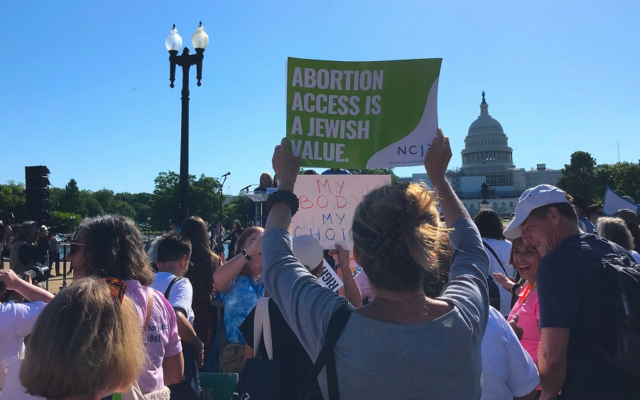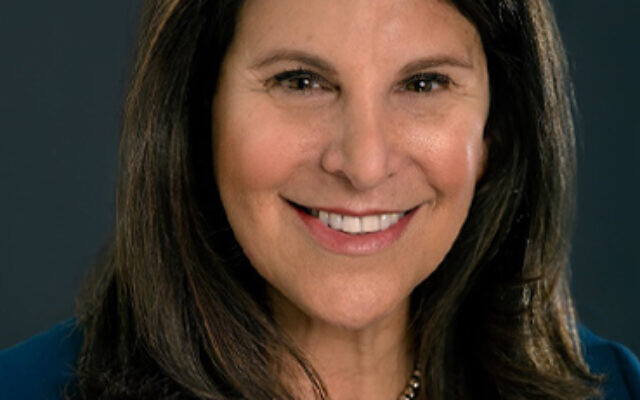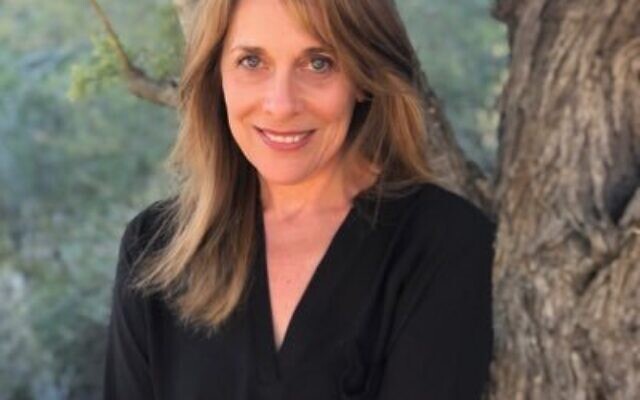NCJW Rally Unites Jewish Pro-Choice Supporters
Jewish women are raising new issues to protect access to abortion.

An increasing number of Jewish women are viewing the probability of the U.S. Supreme Court overturning Roe v. Wade — the landmark 1973 case that legalized access to abortion nationwide — as a threat to their religious rights.
Jewish pro-choice efforts have greatly increased in urgency following the leak, in early May, of a draft of a Supreme Court opinion that would overturn the right to abortion. Jewish groups may take more significant steps in the following weeks or months, as more states limit access to abortion and the Supreme Court issues its final ruling in a landmark Mississippi case.
“I think it is possible to challenge a state law on the question of freedom of religion,” said Laura Kurlander-Nagel, an attorney with the Atlanta-based Johnson Kurlander Legal Group. Kurlander-Nagel is also a co-chair of the reproductive justice committee of the Atlanta section of the National Council of Jewish Women (NCJW) — the group that initiated the Jewish Rally for Abortion Justice in Washington, D.C., even before the leaked opinion by Justice Samuel Alito galvanized the pro-choice movement.
In place of the hundreds of attendees expected to attend, thousands showed up to the May 17 rally from all over the country, as well as from Israel, where abortions are subsidized or free through the national health system, with few restrictions.

The rally was cosponsored by more than 150 Jewish organizations and synagogues and was addressed by rabbis from all major Jewish denominations as part of NCJW’s “Rabbis for Repro” initiative. That initiative includes a large group of American clergy members who have pledged to speak up for reproductive justice within their congregations, including many Atlanta rabbis.
As rabbis from every denomination have pointed out, Jewish law requires you to save a mother’s life. At a May 6 rally of Jewish Voices for Justice and Reproductive Freedom at The Temple, Rabbi Peter Berg said, “To be clear, reproductive choice should have nothing to do with politics [and] the religious right imposing their views on others; this is a deeply religious decision. Jewish tradition, for thousands of years, has stated unequivocally that the fetus is not considered a human being and has no juridical personality of its own.”
In a statement, the Atlanta Rabbinical Association wrote: “As rabbinic leaders representing the Greater Atlanta Jewish community, and members of the Atlanta Rabbinical Association, we are deeply troubled by the possibility that reproductive freedoms in our country and our state could be drastically curtailed with the overturning of Roe v. Wade. While our different streams of Judaism may differ in their parameters for permitting abortion, we are united in our understanding that a blanket denial of access to abortion would be in opposition to Jewish values and ethics as reflected in the Bible and rabbinic teachings.”
The ARA is headed by Temple Beth Tikvah Rabbi Alexandria Shuval-Weiner, the first female rabbi to lead the organization.
Orthodox Rabba Melissa Scholten-Gutierrez, who participated in NCJW’s Repro Shabbat initiative, has written that “any law that limits a person’s ability to access abortion or reproductive health serves limits their ability to practice their faith, and thus violates the First Amendment’s protections of separation of church and state.” (https://www.atlantajewishtimes.com/abortion-is-a-religious-right/)
Another Orthodox rabbi, Adam Starr of Ohr HaTorah, told the AJT, “Judaism’s view on abortion is nuanced and complex. As with most things in Judaism, there isn’t a single accepted position as to what Judaism believes in all circumstances. What is clear is that Judaism’s approach to abortion does not fit neatly into either the ‘pro-life’ or ‘pro-choice’ camp.”
In a 2019 AJT article about a proposed law to limit access to abortion in Georgia, Rabbi Jonathan Crane, the Raymond F. Schinazi Scholar of Bioethics and Jewish Thought at Emory University’s Center for Ethics, noted that under Jewish law, after 40 days, “the fetus acquires some moral status, like that of a thigh. This does not mean, however, that it has the same moral status as a full person. … Only when it has crowned do mother and baby become moral equivalents. Once the baby is a separate entity it becomes a person.” https://www.atlantajewishtimes.com/jewish-law-and-abortion/
Crane also noted that “The Bible (Exodus 21:22) stipulates that inadvertently causing a miscarriage is not a capital crime; it is neither murder nor tantamount to murder. … Thought abortion is not criminalized in Judaism, it is not considered a legitimate method of birth control either.”
In the weeks following the leaked court opinion, several states — led by Oklahoma’s recent ban on abortion after fertilization — have further restricted access to abortion, even in cases of rape or incest.

In an interview with the JTA, NCJW president Sheila Katz said, “For too long, a small but loud group from the religious right has claimed the narrative on faith and abortion. That narrative is simply not true. For too long, Jews have been ignored as part of the conversation, and the only way we can counter a faith narrative is with a faith narrative.”
At the May 17 rally, Katz emphasized that “religious freedom is meant to be a shield to protect people of minority faith communities, not a sword to discriminate against us. The only way we can truly have religious freedom in this country is if every person can make their own decisions for their body, their life and their future.”
Katz told the financial and business news site Insider that the “notion that the Supreme Court might dictate when life begins according to only one religious tradition is deeply problematic and concerning to us.”
A study conducted by the Pew Research Center indicated that 83 percent of American Jews believe that abortion should be legal in most or all cases, compared to 61 percent of the total U.S. population.
“It is a Jewish right and issue for a woman to obtain full maternal healthcare,” said Kurlander-Nagel. Dr. Mimi Zieman, cochair of the reproductive justice committee of NCJW’s Atlanta branch and an OB-GYN, said Jewish values support abortion access for another reason. “It’s a matter of justice. It’s a Jewish value to stand up for the disenfranchised, the minority, young and low-income women. Treating people fairly is a Jewish issue.”
That’s why NCJW recently announced its launch of the Jewish Fund for Abortion Access, an initiative to raise funds for the National Abortion Federation, which helps people get abortions, including funding for lodging and transportation to cross state lines if necessary.

Zieman pointed out that carrying a pregnancy to term comes with a risk of death that can be up to 40 times greater than the risk associated with early legal abortion. Pregnancy is associated with additional morbidities, such as diabetes, pre-eclampsia, blood clots, stroke, hypertension, hemorrhage, infection, preterm labor and postpartum depression. That’s one reason why most major medical societies oppose anti-abortion laws. The American College of Obstetricians and Gynecologists states, “Abortion care is essential health care.”
According to an NCJW statement, Georgia already has one of the highest maternal mortality rates in the country and an abortion ban will likely increase maternal morbidity and mortality, disproportionally harming minority and lower-income people who already face higher risks.
Zieman said that new abortion bans will also impact women in Georgia in several other ways. “Georgia already has a shortage of OB-GYNs,” she said. “They will not want to stay and practice in this state” if the Georgia ban against abortion becomes law.
What doctor “would want to practice in the state if they could be convicted of a felony for saving a woman’s life?” asked Kurlander-Nagel.
Both women also highlighted the threat to in-vitro fertilization (IVF), which involves a number of embryos being implanted, by some versions of state abortion bans. “The ramifications of this decision are overwhelming,” said Kurlander-Nagel.
The AJT contacted the Jewish Fertility Network for its opinion, but CEO and founder Elana Frank declined to comment. “As a non-advocacy organization, we’re going to pass on a comment and leave it to the professionals,” she wrote in an email.
As a lawyer, Kurlander-Nagel said that she is disturbed by the apparent trajectory of the U.S. Supreme Court. “This can unravel decades of law,” she said. “It doesn’t make any legal sense.”
The significance of the court’s abortion opinion, Kurlander-Nagel said, “is different than the gun rights movement. This is different than anything other than the civil rights movement. That was a turning point in our country. This is a justice movement and we need to protest by the millions.”
- Jan Jaben-Eilon
- News
- Local
- NCJW
- Rally
- pro-choice
- pro-life
- Abortion
- Roe v. Wade
- Laura Kurlander-Nagel
- Supreme Court
- National Council of Jewish Women
- Jewish Rally for Abortion Justice
- Rabbis for Repro
- The Temple
- Rabbi Peter Berg
- Atlanta Rabbinical Association
- temple beth tikvah
- Rabbi Alexandria Shuval-Weiner
- Rabba Melissa Scholten-Gutierrez
- rabbi adam starr
- Ohr HaTorah
- Emory University’s Center for Ethics
- Rabbi Jonathan Crane
- Sheila Katz
- Dr. Mimi Zieman
- Jewish Fund for Abortion Access
- American College of Obstetricians and Gynecologists
- Jewish Fertility Network



comments